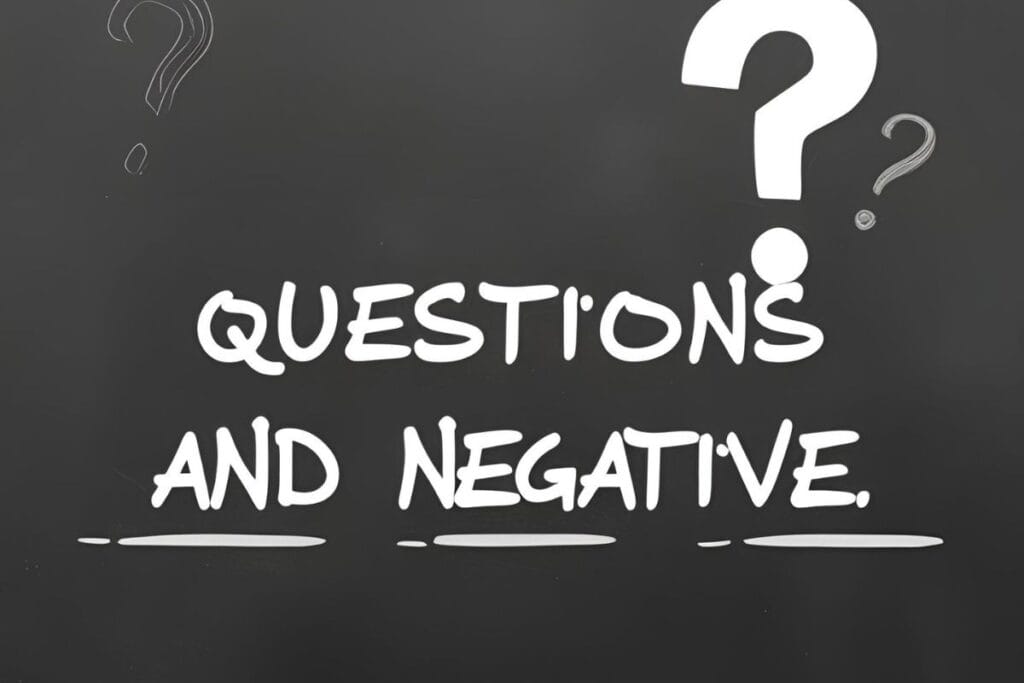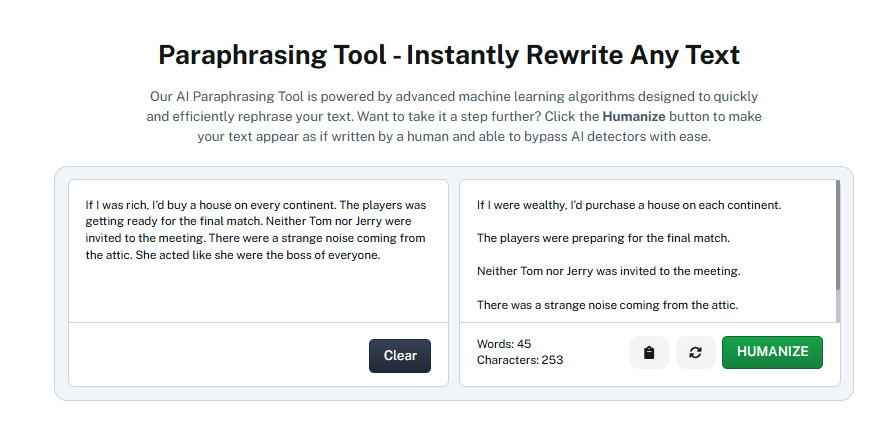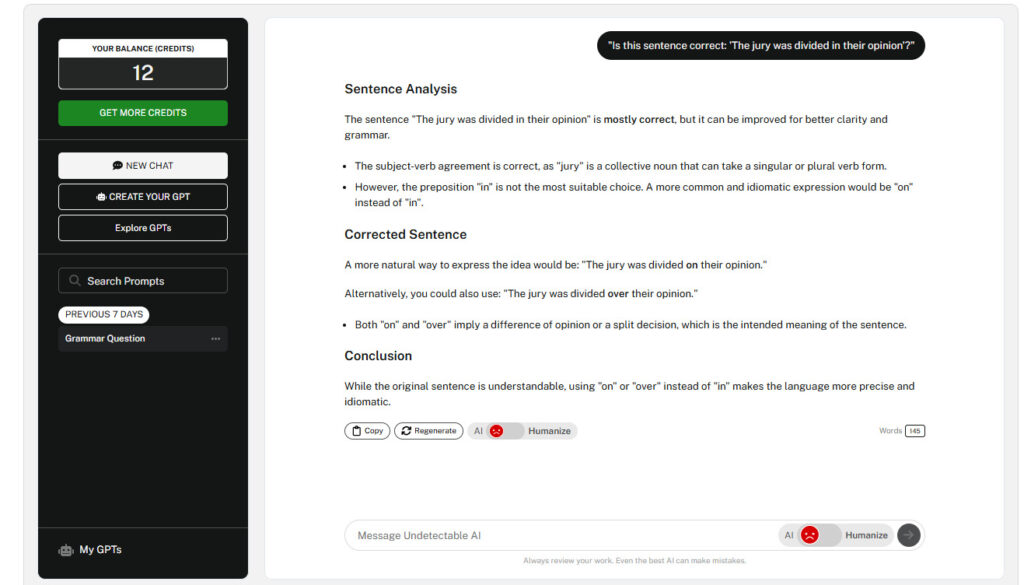It was a beautiful day—until someone said, “If I was you…” and now we’re fighting.
Let’s be honest. Even if you aren’t part of the grammar police, nothing ruins the vibe faster than a grade-school-level grammar blunder.
Distinguishing was vs. were should be easy, but this tricky pair still causes a lot of confusion online and in everyday conversations.
And the wildest part? One of them doesn’t always have to do with the past. It’s about the hypothetical—specifically, the subjunctive mood.
It’s the reason Beyoncé sang “If I were a boy,” instead of “was.” She’s not saying she was a boy, but imagining if she were.
If you’ve ever hesitated mid-sentence on which word to use, you’re in the right place.
Here’s the breakdown you didn’t know you needed (but your English teacher would probably cry happy tears over).
Was vs. Were: The Basic Rule
The difference between “was” and “were” boils down to a simple grammatical concept: they are both past tense forms of the verb “to be” but are used with different subjects.
It might sound simple, but it’s one of those deceptive grammar rules that trips up even the most careful.
Subject–Verb Agreement in Past Tense
“Was” is the singular past tense form. Use it with:
Never Worry About AI Detecting Your Texts Again. Undetectable AI Can Help You:
- Make your AI assisted writing appear human-like.
- Bypass all major AI detection tools with just one click.
- Use AI safely and confidently in school and work.
- First-person singular: I was at the store yesterday.
- Third-person singular: He was late to the meeting. She was happy about the news. It was raining all day.
“Were” is the plural past tense form. Use it with:
- Second-person (both singular and plural): You were right about that restaurant.
- First-person plural: We were planning to visit next week.
- Third-person plural: They were surprised by the announcement.
This might seem straightforward, but there’s a twist. English throws us a curveball with something called the subjunctive mood, which can change these rules.
The Subjunctive Mood (When “Were” Replaces “Was”)
The subjunctive mood expresses wishes, hypothetical situations, or conditions contrary to fact.
In these cases, “were” replaces “was” for all subjects, even singular ones.
When do you use the subjunctive mood? Look for these patterns:
- Wishes: I wish I were taller.
- Hypothetical conditions: If I were you, I’d accept the offer.
- Contrary-to-fact statements: She acts as if she were the boss.
Notice how even though “I” and “she” are singular subjects, we use “were” instead of “was” in these examples.
This is because we’re describing situations that aren’t real.
They’re wishful, hypothetical, or contrary to fact.
Was vs Were in Questions and Negatives
Questions and negative statements follow the same rules of subject-verb agreement, but their structure changes slightly.
For questions, the verb comes before the subject:
- Was I making too much noise?
- Was she at the party last night?
- Were they informed about the change?
- Were you planning to attend?
For negative statements, add “not” after the verb:
- I was not (or wasn’t) aware of that rule.
- He was not (or wasn’t) happy with the results.
- They were not (or weren’t) ready for the test.
- You were not (or weren’t) supposed to see that.
Common Mistakes with Was/Were
Even native English speakers stumble over “was” and “were” sometimes. Here are the most common pitfalls to avoid:
Mistake #1: Using “was” with plural subjects
- Incorrect: The children was playing outside.
- Correct: The children were playing outside.
Mistake #2: Forgetting the subjunctive mood
- Incorrect: I wish I was able to help.
- Correct: I wish I were able to help.
Mistake #3: Confusion with collective nouns
In American English, collective nouns like “team,” “family,” “staff,” and “committee” are usually treated as singular:
- The team was celebrating their victory. (correct in American English)
- The team were celebrating their victory. (acceptable in British English)
Mistake #4: Agreement with compound subjects
When two subjects are joined by “and,” use “were”:
- Incorrect: Jack and Jill was going up the hill.
- Correct: Jack and Jill were going up the hill.
When two singular subjects are joined by “or” or “nor,” use “was”:
- Incorrect: Neither the dog nor the cat were responsible.
- Correct: Neither the dog nor the cat was responsible.
There’s a reason “was” and “were” keep tripping people up, and it’s not just a case of forgetfulness.
It’s partly because English is full of grammar rules with exceptions that contradict everything we learned in school, and partly because casual conversation has blurred the line between “technically right” and “sounds normal.”
Over time, certain errors have become so common that they feel correct.
It also doesn’t help that the subjunctive mood sounds old-fashioned or overly formal, like something from a Jane Austen novel.
Most people never get a proper breakdown of how “were” works in imaginary or “I wish” sentences.
That’s how we end up with people saying things like “I wish I was taller,” instead of applying that weird grammar rule no one remembers until it’s too late.
Practice Sentences
Let’s test your understanding with some practice sentences.
Try to fill in the blank with either “was” or “were”:
- The movie _____ better than I expected.
- If I _____ in charge, things would be different.
- You _____ supposed to call me yesterday.
- The neighbors _____ having a loud party.
- I wish it _____ possible to travel back in time.
- She _____ not happy about the change in plans.
- The committee _____ unable to reach a decision.
- Both of the candidates _____ well-qualified.
- Either my brother or my sister _____ responsible for the mess.
- The data _____ collected over a six-month period.
Answers: 1. was, 2. were, 3. were, 4. were, 5. were, 6. was, 7. was, 8. were, 9. was, 10. were
How to Use AI Tools to Improve Grammar
Sometimes, even after studying the rules, we still make mistakes.
That’s where AI writing tools like Undetectable AI can help polish your writing and teach you in the process.
Let’s see how these tools can assist with “was” vs “were” issues.
Using AI Paraphrasing to Fix Grammar
Just like your vs you’re, was and were often get mixed up, even by native speakers.
The Undetectable AI Paraphrasing Tool can step in to catch both, fixing subtle grammar slip-ups before they turn into full-blown red flags.
Let’s look at some examples:
1. Incorrect: If I was rich, I’d buy a house on every continent.
Correction: If I were wealthy, I’d purchase a house on each continent.
2. Incorrect: The players was getting ready for the final match.
Correction: The players were preparing for the final match.
3. Incorrect: Neither Tom nor Jerry were invited to the meeting.
Correction: Neither Tom nor Jerry was invited to the meeting.
4. Incorrect: There were a strange noise coming from the attic.
Correction: There was a strange noise coming from the attic.
5. Incorrect: She acted like she were the boss of everyone.
Correction: She behaved as if she were everyone’s boss.
Quick grammar fixes like these may seem small, but they’re the kind of slip-ups that can make or break how polished your writing feels.
The AI Paraphraser keeps it clean, sharp, and error-free—no second-guessing needed.
Getting Instant Feedback from AI Chat
Undetectable AI’s AI Chat can provide immediate explanations for tricky sentences.
This is especially helpful when you’re unsure why a particular form is correct or incorrect.
For example, you might ask:
“Is this sentence correct: ‘The jury was divided in their opinion’?”
AI Chat would explain that while the subject-verb agreement is acceptable (since “jury” is a collective noun), the preposition “in” isn’t idiomatic in this context.
It might suggest: “The jury was divided on their opinion” or “The jury was divided over their opinion” as more natural alternatives.
This kind of instant feedback doesn’t just correct your sentence, it helps you sound more precise and native-level without second-guessing every preposition.
Check out our AI Detector and Humanizer right in the widget below!
FAQs: Was vs Were
Is “If I was” ever correct?
Yes, “If I was” can be correct, but it depends on what you’re trying to express:
– Use “If I was” when referring to something that might have actually happened in the past: “If I was rude yesterday, I apologize.”
– Use “If I were” for hypothetical situations or things that are not true: “If I were a millionaire, I’d donate to charity.”
The key difference is reality versus hypothesis. “If I was” suggests the possibility that something actually happened, while “If I were” indicates a counterfactual situation.
Why do some people say “I were”?
“I were” is used in the subjunctive mood to express wishes, hypothetical situations, or conditions contrary to fact.
For example:
– “I wish I were more patient.”
– “If I were in your position, I’d decline the offer.”
This usage follows traditional grammar rules for the subjunctive mood.
The phrase “I were” sounds odd to many modern ears because the subjunctive mood is less commonly emphasized in everyday English instruction, but it remains grammatically correct in these specific contexts.
Can I use “was” with “you”?
No, you should always use “were” with “you” in the past tense, whether you’re addressing one person or multiple people:
“You were right about the traffic.”
“You were all invited to the party.”
This is one of the quirks of English—”you” always takes “were” in the past tense, regardless of whether it’s singular or plural.
The War of Was vs. Were: Peace at Last
Mastering the distinction between “was” and “were” might seem like a small detail, but it’s one of those grammatical nuances that can significantly impact the clarity and professionalism of your writing.
The basic rule is simple: use “was” for singular subjects and “were” for plural subjects, with the important exception of the subjunctive mood, where “were” rules regardless of number.
Grammar isn’t just about following rules for their own sake. It’s about communicating your ideas clearly and precisely.
When you use “was” and “were” correctly, you’re signaling to your readers that you understand the subtle distinctions of hypothetical versus real scenarios, singular versus plural subjects, and formal versus casual communication contexts.
Like any skill, mastering these distinctions takes practice.
Read widely, write regularly, and don’t be afraid to use tools like Undetectable AI when you’re uncertain.
Over time, the correct usage will become second nature, and you’ll find yourself making fewer errors.
Remember, even accomplished writers occasionally stumble over grammar rules. The goal isn’t perfection but progress.
With each correction and clarification, you’re building a stronger foundation for effective communication, one “was” or “were” at a time.





